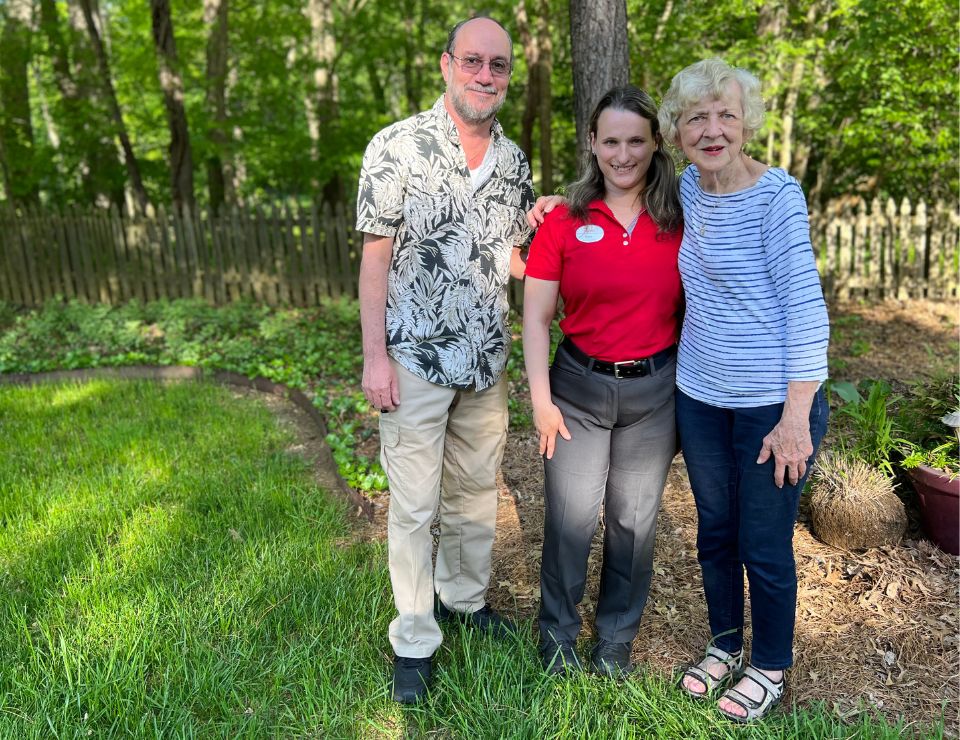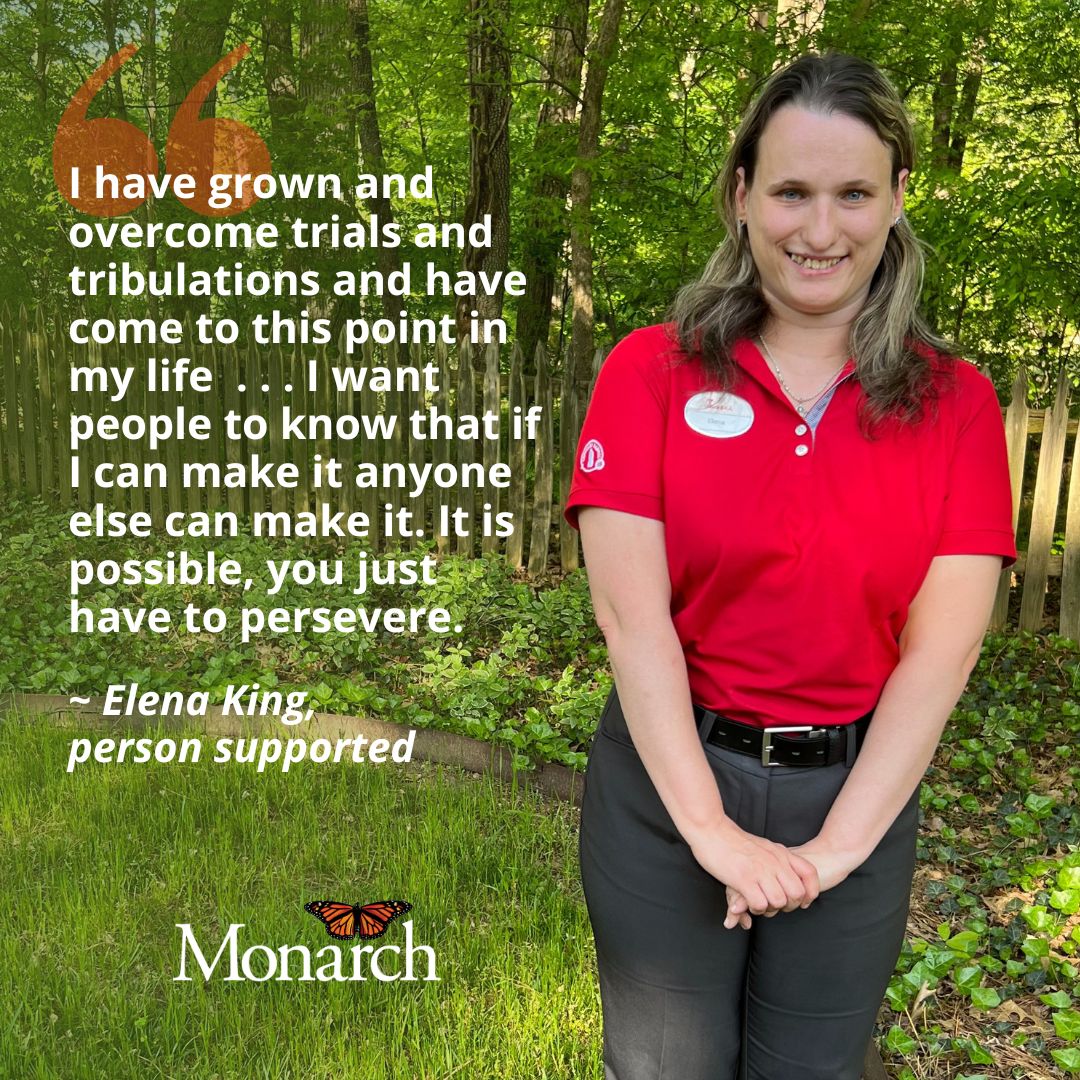Finding Home: Support Helps Elena King Become Independent

Elena King, center, is seen at her childhood home with her father, John, and mother, Geri.
Geri and John King of Harrisburg are proud of their daughter, Elena. Her bright smile and outgoing personality at age 32, belie an early childhood spent in a Russian orphanage before arriving in North Carolina when she was adopted.
Today, she is making plans to live independently moving into her own apartment a short 10-minute drive from her parents and childhood home.
Elena has received mental health care for the past 10 years through Monarch’s Stanly Behavioral Health Outpatient Clinic and regularly visits with Medical Director Dr. Robert McHale, M.D., M.Sc., DFAPA, ABPM, FASAM.
Elena met Dr. McHale while she was a resident at Monarch’s Windermere Home in Kannapolis, a group home for residents with mental illness. After she was a Windermere resident, she returned to live with her parents although she continues under Dr. McHale’s care receiving medication management for diagnoses that include intellectual disabilities and schizoaffective disorder.
Coming Home
The Kings remember how Elena became their daughter, adopting her through Catholic Charities Diocese of Charlotte when she was 6 years old. At the time, Geri was a director at Catholic Charities and overseas adoption opportunities were often shared with staff.
Before meeting Elena in person, the couple’s first glimpses were in photographs and video taken at the Russian orphanage where she lived. She was older than the other children and plans were underway to move her to another location. They peered into the young child’s blue eyes looking back at them. They believed they had found their daughter.
In the fall of 1996, the couple traveled to a small Northern town outside of Moscow to meet their daughter and bring her home. Geri recalls the stark, cold countryside, the orphanage filled with children and how she wanted to go home bringing all the children she met with her. Elena said her goodbyes to the orphanage staff who cared for her and the newly formed family headed to a new life in the U.S.
 Geri says Elena easily learned English however, at first, her school day was shortened because she couldn’t endure a full eight hours. She was diagnosed with attention deficit hyperactivity disorder (ADHD). “Things began to go awry throughout the school years. During high school, she saw a neurologist and was placed on medication,” Geri explains. Her father noted that while a student at Cabarrus High School, she was on the vocational studies track and thrived.
Geri says Elena easily learned English however, at first, her school day was shortened because she couldn’t endure a full eight hours. She was diagnosed with attention deficit hyperactivity disorder (ADHD). “Things began to go awry throughout the school years. During high school, she saw a neurologist and was placed on medication,” Geri explains. Her father noted that while a student at Cabarrus High School, she was on the vocational studies track and thrived.
She tried group home and foster home settings, as well as alternative family living (AFL) and none seemed to help her thrive. She lived at Monarch’s Windermere Home in Kannapolis for five years before returning back home to live with her parents in Harrisburg.
Working Toward Independence
Elena told her mom and dad her goal was a job that would be challenging, rewarding and help her learn to be independent. With her parents’ and employee mentors along the way, support was put in place to help her reach her goal.
She attended an adult day program where attendees assembled parts exceeding production records, at a company that sterilized hospital instruments and in dietary services at a nursing home. Elena’s outgoing personality fit aspects of each job but she wanted something different.
She applied for a job at her hometown Harrisburg Chik-fil-A restaurant, interviewed and received a job offer for a 25-hour, five-day-a-week position. She is proud to wear her red shirt and nametag when she works in the main dining room keeping it tidy and assisting customers.
Since being employed, Elena’s mom has seen her daughter mature and successfully tackle her goals: “She is becoming her own person and feeling good about herself that she has ability that she can do more and wants to do more . . . She is handling it beautifully.”
Looking Toward the Future
Dr. McHale echoes that a strong and dependable support network of family and extended family has positive effects on how an individual thrives. “A network of support always improves the outcomes of our patients and their families. No one lives in isolation and when you have support you give the patient the best opportunity for success,” he observes.
Dr. McHale explains that a solid network of family support, Elena’s ability to monitor how and when medications affect her and communicating that information has helped her thrive. “I am most proud that she takes ownership of herself and her treatment. Her understanding of how her body reacts to the prescribed medications aids us in monitoring and being able to slowly reduce medications,” he notes.
Elena is preparing to move into her apartment and is eager to have a place of her own to call home. “I am excited to get it and sign the papers for it. The first thing in my new apartment, I will have an open house . . . I am going to invite people who have helped her along the way,” she says.
Despite obstacles through the years, Geri and John advised other parents to not lose hope. “You never give up. You just keep putting one foot in front of the other. We knew there was more for Elena and realized her potential,” mom says.
Geri, glancing over at her child, shares the hopes and dreams she has for her daughter: “I want more steppingstones for her. I really think she hasn’t landed yet. . . Every one of her experiences has prepared her for the future. She has dealt with disappointment. She has had wonderful memories. I think the sky is the limit and she isn’t there yet.”
To meet Elena, click on the video below or visit Monarch’s YouTube channel here. For information about Monarch’s Behavioral Health services, visit here or call (866) 272-7826 to get started.
Posted on: Friday July 21, 2023
